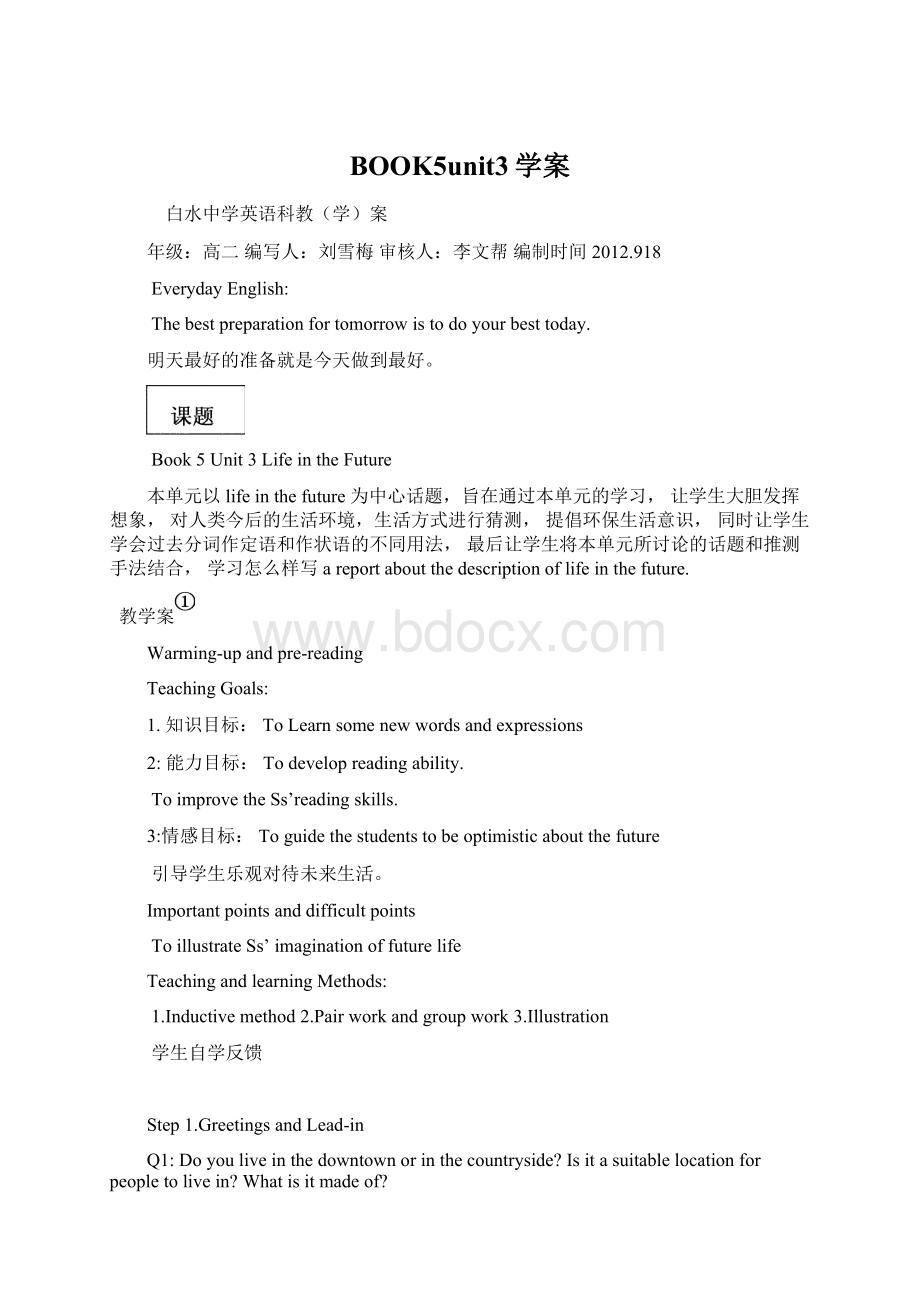BOOK5unit3学案Word文档格式.docx
《BOOK5unit3学案Word文档格式.docx》由会员分享,可在线阅读,更多相关《BOOK5unit3学案Word文档格式.docx(18页珍藏版)》请在冰豆网上搜索。

TeachingandlearningMethods:
1.Inductivemethod2.Pairworkandgroupwork3.Illustration
学生自学反馈
Step1.GreetingsandLead-in
Q1:
Doyouliveinthedowntownorinthecountryside?
Isitasuitablelocationforpeopletolivein?
Whatisitmadeof?
Q2:
Whatmeansoftransportdoyouknow?
Q3.Wherewouldyouliketoliveinthefuture?
Q4.Whatkindofhousingwouldyouliketohaveinthefuture?
探究:
Imaginewhatthefuturemeansoftransportwillbelike?
Step2.WarmingupandPre-reading(p.17)
Step3.课堂检测(Keywordsandphrases)
1.定居;
解决n._____________v.使定居,安排;
定居_______
2.v.包围,围绕______n.周围的事物/环境_______adj.周围的________
3.pressv._________pressuren._______4.在前的;
早先的______
5.方/层面___________6.调整/节v_______n____________
7.certain(反义词)_______n.________adv.______________
8.指导/导游_______9.takeup____________10.besimilarto________
11.向四面八方______________12.对......乐观_____________
13.看不见...________insight________outofsight________14.bebackonone’sfeet________15.溜进_______16.sweepup_______
※Step4.改错(附加题)
WhenIwasjuniorhighschoolstudent,IthinkEnglishwasveryeasy.SoIkeptmyselfawayfromit.Ineachtest,Igotmorethan50marks.ButmyEnglishteacherencouragedwithme.Hesaid
Englishwasnotsohardastheyappeared.Heaskedmethefirsttobuildupself-trustthenimprovedmypronunciation.Whenalessonwasgiven,hetaughttowriteshortcompositions.UnderhistirelessinstructionIdidsurprisinglyfastprogress.Inthefinalexam,Iget95points.
Step5.反思
Book5Unit3LifeintheFuture
教学案
Readin
g
TeachingGoals
1.知识目标:
Readthepassagefluently.
2.能力目标:
3.情感目标:
KnowthemoreadvancedformsoftransportinAD3008andtheadvantagesandproblemsoflifeinthefuture.
Step1.Dictation.
Step2.Skimming.
1.Finishthefollowingtable.
Writingstyle
Whosefirstimpressionisit?
2.Thepassageismainlyabout:
A.howLiQiangwastransportedtothefuture.
B.howLiQianggottothefutureandhisfirstimpressionofit.
C.whatthelifeislikeinthefuture
3.Matchthemainideawitheachparagraph.
Para.1A.Myimpressionoflifeonethousandyearsintothefuture.
Para.2B.StayinginWangPing’shome.
Para.3C.Thejourney
Para.4D.HowIcametotakeatimetraveljourney.
Step3.Scanning.
1.Whichchangesarementionedinthetext?
探究:
Whichchangesaregoodandwhicharebad?
2.WhydidLiQiangtraveltotheyearAD3008?
3.Howdidhegettotheyear3008?
4.Whatwasthegreenwallmadeof?
What’sthepurposeofthiskindofgreenwall?
Step4.Readingfordetails
Beforethejourney
(1)
Lifelt_________and________atfirst;
asaresulthesufferedfrom__________.
Duringthejourney
(2)
Liwastransportedsafelyintothefuture.______bythenewsurroundings,Liwashitbythe________offreshairandhishead_______.
Afterthejourney
(3)
Arrivingata__________house,Liwas________intoalarge,brightcleanroom.AfterWangPingleft,Lihada______mealandahotbath.________,heslidintobedand_____fast_______
Step5.Consolidation
AskSstotellthefollowingsentencesareTrueorFalse(TorF)
(1)LiQiangwasworriedaboutthejourney,sohewasunsettledallthe
time.
(2)WangPingishisfriendwhoisalsoagoodguide.
(3)Hisheadachedbecauseoflackofoxygen.
(4)LiQianglostintouchwithWangPing,buthefoundhimatlast.
(5)
WangPing’smotherwasnotfriendlytohim.
Whatdoyouthinkhascausedthelackofoxygeninthethirdparagraph?
Step6.课堂检测----专家伴读P53.(4)
Step7.反思
学案
Learningaboutlanguage
:
知识目标:
Howtousethekeywordsandexpression.
1.Cooperative2.Discussion3.Illustration4.Self-check
学生自学反馈
Step1.Explanation.
1.impressionn.印象,感想(后面常与·
on连用)
eg.ThebeautyofWestLakemadeadeepimpressiononme.
西湖的美景给我留下了深刻的印象。
搭配:
make\leave\adeepimpressiononsb.
givesb.adeepimpression给某人留下深刻印象
拓展:
impressiveadj.给人深刻印象的
impressvt.使......获得深刻印象,使......铭记
impresssth.on/uponsb.=impresssb.withsth.
给某人留下深刻的印象;
使铭记
单项填空:
Shespokeveryconfidentlybecauseshewantedtomakeagreat
_____onheremployeratthefirsttime.
A.influenceB.pressureC.impressionD.effect
2.takeup从事;
占(时间时、空间、注意力等);
继继
Thistabletakesuptoomuchroom.这张桌子太占地方
Shehastakenupajobasateacher.她当上老师了。
Thischaptertakesupwherethelastoneoff.本章继续上一章的内容联想拓展:
takeoff脱掉;
起飞;
takeover接管
takeapart拆开takefor把……视作;
误认为
take...forgranted认为……是理所当然
takedown写/记下takeback收回(诺言)
单项填空
Sincethe2008OlympicGamesBeijinghastakenanewlookeverywhere.A.upB.onC.overD.Off
3.lackn.&
vt.
1)n.缺少;
没有(后面常与介词of连用)
eg.Theplantdiedforlackofwater.植物因缺水而死。
eg.Theprojectfailedforlackofmoney.这项工程因资金不足而失败
2)vt.缺少;
缺乏lacksth.
eg.Welackedthestrengthtowalkanyfurther.
我们没力气了,不能再往前走了。
vi后常接forlackforsth缺少;
需要
注意:
lack不用于被动语态
Theylackedfornothing.他们无所需求。
拓展:
a/thelackof...……的缺乏belackingin缺乏(品质,特点等)
lackingadj.匮乏的;
不足的;
没有的
eg.Sheseemstobelackingincommonsense.
高考聚焦
(1)单项填空
Thoughmoney,hisparentsmanagedtosendhimtouniversity.A.LackedB.lackingofC.LackingD.lackedin
(2)完成句子
他缺乏信心。
He.
4.adjustmentn.调整;
调节适应
eg.Ihavemadeafewadjustmentstotheplan.
我以对计划作了几处调整。
adjust.v.
(1)调整;
调节
Thebuttonisforadjustingthevolume.这个按钮是调节音量的。
(2)适应;
习惯adjusttosth./adjustoneselftosth.
You’llquicklyadjusttostudentlife.你将很快适应学生生活。
5.pressV.&
n.
1)v.①按,压,挤,推,贴,熨平(衣服)
Pressthebutton.按按钮。
Theshoesarepressingmyfeet.这鞋挤我的脚。
②逼迫,敦促
Hepressedhisfathertobuyhimacar.
他逼着父亲给他买一辆车。
2)n.①按,压,挤Hegavethebellanotherpress.他又按了一下铃。
②thepress新闻界;
新闻工作者
Thepresswasnotallowedtoattendthetrial.庭审谢绝新闻采访。
③出版社
Step2.Keysentences(重点句型)
1.ThenWangPingflashedaswitchonacomputerscreen,andatable
andsomechairsrosefromunderthefloorasifbymagic.
然而王平在电脑荧屏上的开关闪了一下,于是一张桌子和几把椅
子就像变魔术似的从地板下面升了起来。
①fromunderthefloor从地板下面
②asifbymagic像变魔术那样
asif=asthough“似乎/好像”引导方式状语从句
from后面有时可接介词短语或where从句。
fromunderthefloor从地板下面
联想拓展:
frombehindthedoor从门后面
fromunderthetable从桌子底下
Fromunderthetreethemankeptaneyeonthesheep.
那个老人从树下留意着他的羊。
单项填空
Hisheadsoonappearedoutofthewindow,hesawnothingbuttrees.A.whereB.whichC.thereD.fromwhere
2.Insidewasanexhibitionofthemostup-to–dateinventionsofthe31st
century.里面陈列着31世纪的最新发明。
这是一个完全倒装句,句子的真正主语是anexhibition.表方位的副词或介词短语,如here,there,up,down,in,away,off,out,等置于句首时,常引起完全倒装。
eg.Outrushedthechildren.孩子们冲出去了。
Infrontofthehousestandsatalltree.在房子的前面有一棵大树
Step3.课堂检测
1.Wedidnotbuyanythingbecausewe______money.
A.shortofB.wereshortofC.lackingforD.werelackingfor
2.Afterheretiredfromoffice,Tom_____paintingforawhile,butsoon
lostinterest.
A.tookupB.savedupC.keptupD.drewup
3.Unless____,theboywouldn’thaveadmittedthatitwashewhobroke
thevideo.
A.bendingB.remindedC.pressedD.questioning
4.Thethiefmusthavehiddensomewhereinthe________area.
A.followingB.surroundingC.surroundedD.surroundings
5.MyfriendMartinwasverysickwithastrangefever;
______,hecouldneithereatnorsleep;
A.asaresultB.afterallC.anywayD.otherwise
Step4.反思
Grammar:
过去分词作状语
班级:
授课完成时间:
教师:
__________
三维目标
Thepastparticipleusedasadverbial过去分词作状语
Howtousethepastparticipleusedasadverbialcorrectly.
LetSsbecomeinterestedinthegrammarlearning.
Importantpoints:
Howtousethepastparticipleusedasadverbial.
Step1.Discoveringusefulstructures
Workinpairstotranslatethefollowingsentencesandtrytounderstandtheuseofthepastparticiples.
1.Worriedaboutthejourney,Iwasunsettledforthefirstfewdays.
2.Hitbyalackoffreshair,myheadached.
3.Exhausted,Islidintobedandfellfastasleep.
Step2.Grammar.
1.过去分词做状语时,常表示时间、条件、原因、伴随、让步等含义,相当于一个状语从句,一般用逗号与其他成分隔开。
过去分词做状语时,他的逻辑主语与句子的主语一致,与句子主语是被动关系。
过去分词表示的动作先于谓语动词的动作发生,或者与谓语表示的动作或状态几乎同时发生。
eg.Seenfromthetopofthehill,ourschoollooksmorbeautiful.
(1).表示时间,过去分词之前可用连词when,while
Seenfromthespace,theearthlooksblue.
=Whenitisseenfromspace,theearthlooksblue.
(2).表示条件
Keptinrefrigerator,thesevegetableswillremainfresh.
=Iftheyarekeptinrefrigerator,thesevegetableswillremainfresh.
(3).表示原因
Deeplymovedbythestory,thechildrenbegantocry.
Astheyweredeeplymoved,thechildrenbegantocry.
(4).表示伴随情况(可转化为并列的谓语动词)
Shewalkedoutofthehouse,followedbyherlittledaughter.
Shewalkedoutofthehouse,andw